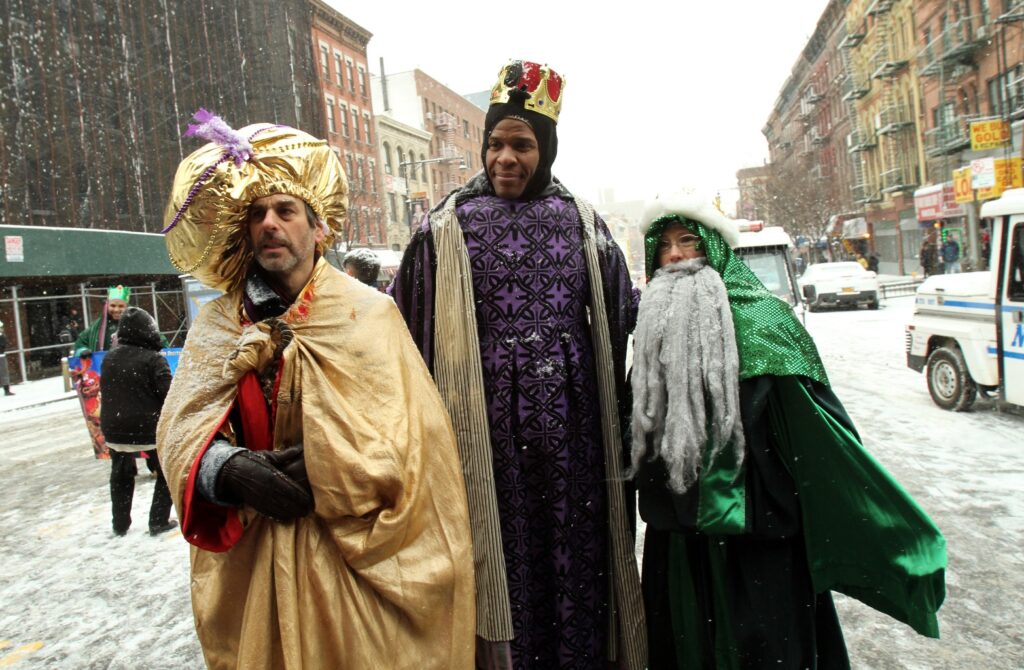
Traditionally, most people think the Christmas season ends on January 6th, which is the feast of the three kings or Epiphany. However, the official day for Catholics to end the season is the feast of the baptism of the Lord, which is always celebrated the Sunday after the Epiphany.
Three Kings’ Day celebrates the Three Kings, or Three Wise Men, as they visited baby Jesus after his birth, each bearing a symbolic gift.
Gold was associated with the belief that Jesus was the King of Jews. Frankincense, which is often burned in churches today, was meant to represent the divine nature of Jesus and the fact that people would come to worship him as the Son of God. And myrrh, a perfume sometimes used to embalm dead bodies, represented the fact that Jesus would eventually suffer and die.
Today, children celebrate Three Kings’ Day by receiving gifts of their own. Children in Spain and Latin America are instructed to leave their shoes by the door of their house so, like Santa Claus, the three kings can come and leave them presents.
Magna Velazquez shared with me about her memories and the importance of ongoing tradition around the Three Kings Day as a Puerto Rican now living in New York City. She shared that her culture celebrates the Three Kings Day even more than the Christmas Day celebration on December 25th.
Magna recalls many childhood memories and traditions.
Like the birth of Jesus, Three Kings’ Day carries many traditions with the community at their core. In some instances, people were poor and had no gifts to give, but regardless, we found something to share, and the gathering was the celebration. Puerto Rico celebrates the kings with carnivals, parades, fairs, and feasts that tourists are welcome to participate in, too. Three Kings Day is one of the most important holidays on the Puerto Rican calendar, and the island does not hold back when it comes to celebrations. At many of the parades, locals dress up as the Three Kings themselves, Melchior, Gaspar, and Balthasar. The kings would throw gifts in the air, and the children would grab as many gifts as they could. There was happiness and a sense of sharing in the streets that I can’t describe, and it was contagious for the children and adults alike. Puerto Rico is already known for its hospitality, and it gets amplified this time of the year.
Aside from the lively street parades and festivities, food is also central to the celebration. Magna prepares roasted pork on a stick with two anchors on each side outdoors over charcoal. The pig continuously gets turned for hours until the skin turns crispy, and the toasted smell fills the air. The pig is served with the classic dish of rice with pigeon peas, or gandules. Pasteles and a variety of vegetables are also part of the dinner, and an array of dessert options like arroz con leche, turron, and all kinds of other sweets with coconut milk, accompanied with a glass of coquito.
Even though Magna has left Puerto Rico to live in the United States, she has brought all of these traditions with her. She ensures that the next generation knows about their heritage, and looks forward to gathering the family together in New York City. She sees the continuation of these traditions as she views her faith. As Catholics, we celebrate the church for centuries and centuries, so why let it die? If people would not keep showing their kids these traditions, then the traditions die. But like our traditions, and like our Church, they will never die as long as we continue to be good examples.
Magna smiled as she recalled her favorite childhood memory when her parents would give them empty shoeboxes and tell them to go find the best hay possible for the camels. Her parents told her that if they found the best hay, the camels would be able to transport the three kings who could leave them presents. She would see all her friends and kids looking for hay with joy and innocence. Innocence is the most beautiful part of the childhood experience, she said. It is so fun to believe.
As an adult, Manga’s message to the youth is consistent with this childlike belief. She encourages the youth to believe that God is alive, believe in him, and don’t be commercialized. She hopes the youth can let the king be born into their heart and stay there. This is the greatest gift you can give yourself or others, she said.
Magna also uses this time of the year to celebrate and honor the importance of family. We always look for any reason to gather together as a family, and Three Kings’ Day allows us to do that. It does not matter how much money you have, or what gifts you can bring, we are together, celebrating the Lord, our family, and our lives.
That is what really matters, not only on January 6th but all year long.
Magna Velazquez is a long-time member of St. Joseph and St. Mary Immaculate Parish in Staten Island, New York. She is retired from working many years in the coffee industry. Currently, she takes care of her brother, who she lovingly calls Pito and who requires special care and attention.


